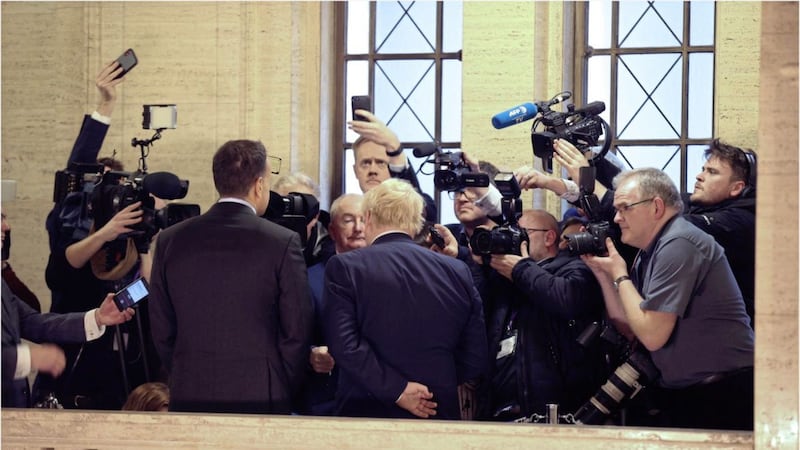Suddenly politics has come alive, north and south. In the north, after three years of pathetic inaction where the horizon looked grey and bleak, power-sharing is restored. The necessary compromises were made and, for once, tribalism suffered a setback.
Once upon a time we had the Good Friday Agreement but, last week, the Thursday Night Draft caught the headlines. It was a good idea to launch the ‘New Decade, New Approach’ document, as it is officially known, three years to the day since the collapse of the last power-sharing executive. Indeed it was quite haunting to listen to a repeat broadcast of Martin McGuinness announcing that break-up with the Democratic Unionist Party in a voice so far removed from his normally-vibrant tones: ten weeks later he was dead.
You could hardly get two leaders further removed in outlook and background than McGuinness and Rev Ian Paisley. If you had predicted they would create one of the most successful political partnerships in modern times, your sanity would have been questioned. But they both realised there was no other option.
The same could be said of the current Stormont rapprochement. The draft agreement produced in February 2018 didn’t catch on, but at this stage we are confronted with the Northern Ireland equivalent of Brexit Fatigue. The British electorate were bored and aggravated to such an extent by the endless to-ing and fro-ing over European Union membership that they responded readily to Boris Johnson’s slogan: “Let’s get Brexit done”. Likewise it is fair to say that many people in the north were so sick and tired of the local political vacuum that they were taking a fresh look at parties such as the Alliance and SDLP.
Having reported in detail and even written a book about the Good Friday negotiations, I can attest that the role of Tony Blair and Bertie Ahern (with Bill Clinton busily phoning people in the background) was critical. Ably assisted by the likes of Mo Mowlam and an army of civil servants they carried out the primary function of government representatives on these occasions, namely, to knock heads together.
Likewise, Julian Smith and Simon Coveney and their teams did the heavy lifting on this occasion. Holding out the prospect of an Assembly election if no deal was done brought a touch of realism to the deliberations.
The implementation of the proposals on the Irish language will of course be closely monitored on all sides. It is true that the new Irish Language Commissioner’s activities will in principle be subject to veto by the DUP first minister. That’s one of the realities of power-sharing but another reality is that any repeat of such actions as cutting the modest funding for people to attend courses in an Irish-speaking district will not serve to prolong the life of the newly-installed administration. That’s another reality of power-sharing.
Not many people were aware that legislation ruling out the use of any other language but English in court proceedings was repealed in England and Wales in 1863 but has remained in force in Northern Ireland until now. We are told that the Administration of Justice (Language) Act, passed by the native – but not very representative -- Irish parliament in 1737, is being scrapped. About blooming time.
South of the border (and north-west when you take account of Donegal) a pedestrian and rather dreary political scene has acquired a splash of colour with the prospect of a general election in the very near future. There is considerable excitement among the media at least, although this has not spread to the general public as yet. The current administration led by Fine Gael may give way to an alliance headed by Fianna Fáil, but both major parties have firmly ruled out a coalition involving Sinn Féin. Yet some observers believe there is a possibility, however remote, that this could change when the votes are counted, if the figures mean that Mary Lou McDonald and her friends are needed to form a government.
Don’t bet the house – or even Leinster House – on it, but gaining power is often a numbers game. Politicians don’t like eating their words but there are times when reality bites and you have to grit your teeth.
Ddebre1@aol.com








